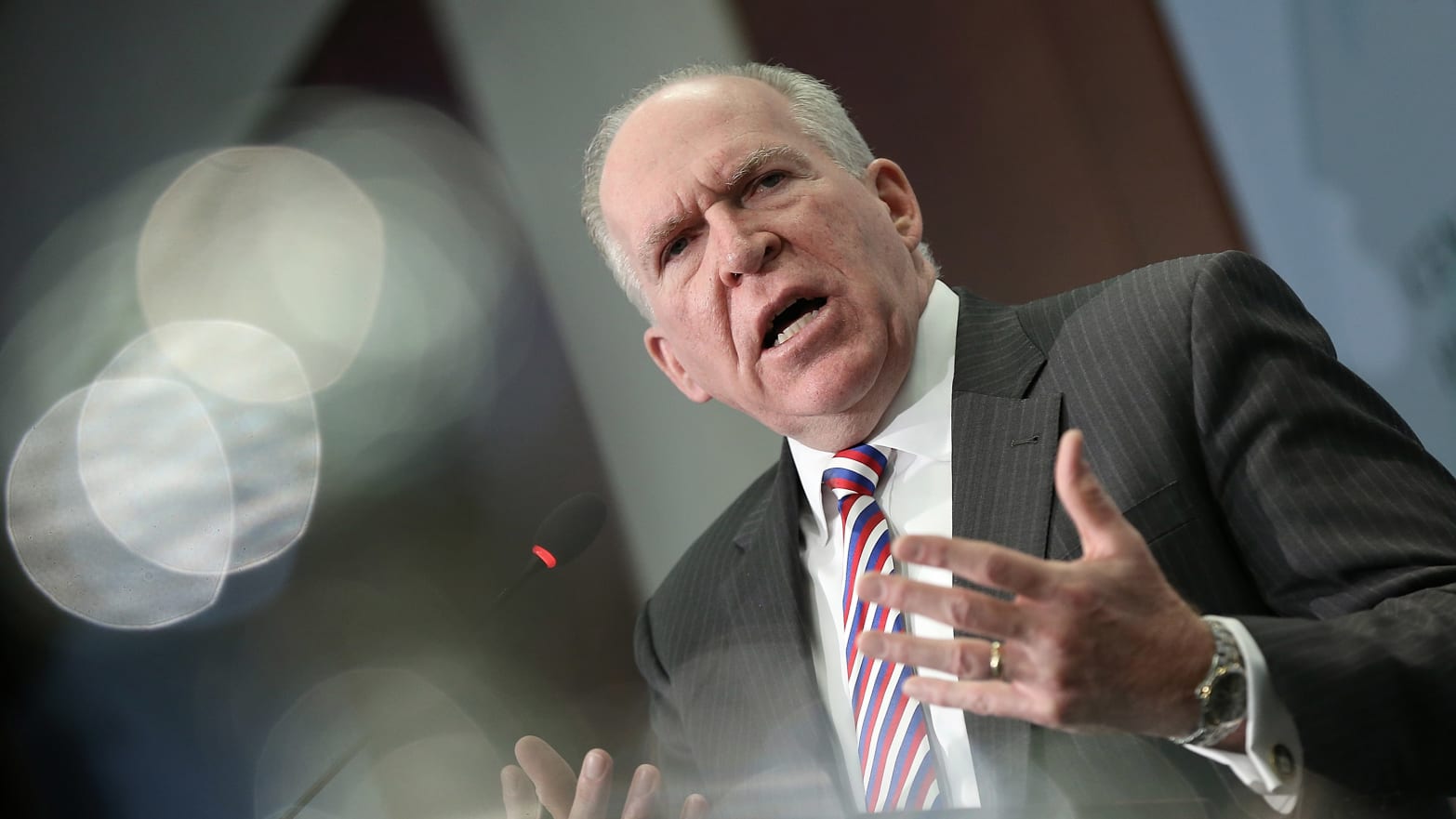John Durham, the federal prosecutor assigned by Attorney General William Barr assigned to review Robert Mueller’s Trump-Russia probe, still hasn’t interviewed at least five key potential witnesses or targets, multiple sources familiar with the issue told The Daily Beast.
According to four sources familiar with the developing probe, Durham has yet to interview several former senior officials involved in the origins of the intelligence and law enforcement probes of Russian election interference and potential ties to the Trump campaign, nor Obama administration officials Trump insists without evidence orchestrated them. That’s the mandate of Durham’s year-old probe, which has expanded into a criminal inquiry that has alarmed many ex-intelligence officials as political retribution.
Still not interviewed by Durham are former CIA Director John Brennan, former FBI Deputy Director Andrew McCabe. Nor have been former FBI agent Peter Strzok, former FBI attorney Lisa Page, both of whom were involved in the FBI’s “Crossfire Hurricane” inquiry and whose texts disparaging Trump have for years been presented by the president as proof he was framed. Nor has former National Security Adviser Susan Rice, who, despite not being an intelligence or law enforcement official, has been another Trumpist target.
Durham not interviewing Brennan is particularly noteworthy. In February, the New York Times reported that Durham appeared to be circling Brennan, who has called Trump “treasonous,” for allegedly cooking the 2016-era Russia intelligence. The CIA would not answer if it had provided Brennan’s records to Durham, as the Times reported Durham has requested, and deferred comment to the Justice Department.
A spokesperson for Durham declined comment for this story.
Everything about Durham’s probe is the subject of extensive speculation in national security circles—though rarely for the record—particularly the length of time it’s gone on without visible progress. (Nearly seven months ago, Durham’s investigators had reportedly interviewed two dozen current and former FBI officials.) Some consider it in line with Durham’s typical practice. His investigation of CIA torture lasted three years before fizzling out. Others wonder if Durham will announce the results of his inquiry, or even criminal charges, closer to November’s presidential election.
In recent days, President Trump has been hinting that big revelations are forthcoming documenting malfeasance or illegality coming from his perceived enemies in the Obama administration and the intelligence agencies. Trump and his allies have begun referring to a conspiracy theory they’re calling “Obamagate” that’s so convoluted, even he is unable to explain what it really is. Nevertheless, Trump claims it’s “the biggest crime in American political history.”
The person most likely to make this narrative come to life is Durham, the U.S. attorney for Connecticut. “You have Bull Durham, who’s supposed to be the toughest,” Trump enthused in November.
Durham carries a reputation for probity and rigor—though at least one person impacted by Durham’s work considers that undeserved. Durham was best known previously for an investigation of the Boston FBI’s mob ties that helped inspire the Martin Scorsese movie The Departed. After that, he led a sprawling investigation into the destruction of CIA torture videotapes by now-Director Gina Haspel and her then-boss Jose Rodriguez, and then CIA torture outright. In 2012, he declined to bring any charges against CIA torturers.
Durham has reportedly interviewed lower-level CIA, FBI, and NSA analysts and officials for his current investigation. The highest-profile official known to have spoken with Durham is retired Admiral Mike Rogers, the director of the NSA at the time of the joint January 2017 intelligence assessment that Russia interfered in the election on Trump’s behalf. The Republican-led Senate intelligence committee recently supported the findings of that assessment. The Intercept first reported Rogers’ multiple interviews with Durham.
A year ago, Barr appointed Durham to investigate the origins of the Trump-Russia probe. (A year into the Mueller probe, Vice President Mike Pence called on Mueller, “in the interest of the country,” to wrap it up.) Since then, Durham’s probe has become a criminal inquiry. That’s raised fears amongst former intelligence officials that their analytic judgments will be treated as criminal.
“I have some concern whether someone with a prosecutorial background is going to understand the way analysts’ minds work, and whether it’s dangerous to apply those prosecutorial tools for understanding intelligence analysis,” said Robert Litt, the senior attorney for the director of national intelligence when the Russia probes began. Litt, a former Justice Department official who’s interacted with Durham repeatedly ever since the Whitey Bulger case, called the prosecutor a “straight shooter.”
Litt also has not been contacted by Durham. An attorney for former FBI Director James Comey, David Kelley, did not respond to inquiries from The Daily Beast. Kelley gave an interview in November saying Comey has “continued to cooperate with all inquiries, from Congress, the Department of Justice and the Inspector General.”
Barr has stoked concerns like the one Litt expressed. His Justice Department has shown leniency to Trump’s allies Roger Stone, Paul Manafort and Michael Flynn. By contrast, he recently told Laura Ingraham of Fox News about Durham’s investigation, “If people broke the law, and we can establish that with the evidence, they will be prosecuted.”
Among the causes for alarm about Durham by ex-intelligence officials came in December, when Durham publicly disagreed with the Justice Department’s inspector general that the FBI was justified in opening its counterintelligence probe on the Trump campaign. “We do not agree with some of the report’s conclusions as to predication and how the FBI case was opened,” Durham said. That highly unusual statement has been Durham’s only major public utterance about his inquiry.
“It was unnecessary and inconsistent with typical practice when there’s an investigation ongoing,” Litt said. Added Daniel Jones, a former FBI counterterrorism analyst and lead investigator for the Senate torture report, “I thought it was remarkable, unheard of, and points to why many believe the Department of Justice is off the rails.”
Jones has a particular history with Durham. Durham refused to cooperate with the Senate torture probe Jones led. That meant Jones couldn’t interview CIA officials involved in the torture program, since they would potentially open themselves up to criminal liability. It became a key line of attack on the Senate torture report.
The terms of Durham’s CIA inquiry limited his focus to cases where CIA agents acted outside the already-broad scope of since-rejected torture authorizations issued by the Justice Department. That happened repeatedly, Jones’ inquiry found, as CIA interrogators used power drills, mock executions and even the sexual assault of inserting pureed food and water into detainees’ anuses. But Durham declined to bring any charges—nor did he deconflict his inquiry with the Senate’s, even after Durham’s inquiry ended.
“There are so many unanswered questions,” Jones said about Durham. “Why did Durham break from years of established practice and refuse to engage with the Senate’s bipartisan investigation of the CIA? He must have known this would prevent the Senate from accessing CIA personnel for interviews. Why did Durham just look at 101 detainees—when even the CIA concluded they held at least ‘112-plus’? How did Durham fail to bring charges against any government personnel for torture tactics that even the CIA agrees were never a component of the so-called [DOJ] ‘torture memos’? And how is it the Durham investigation ended just mere months before the Senate approved its near-7000 page report on CIA torture?”

